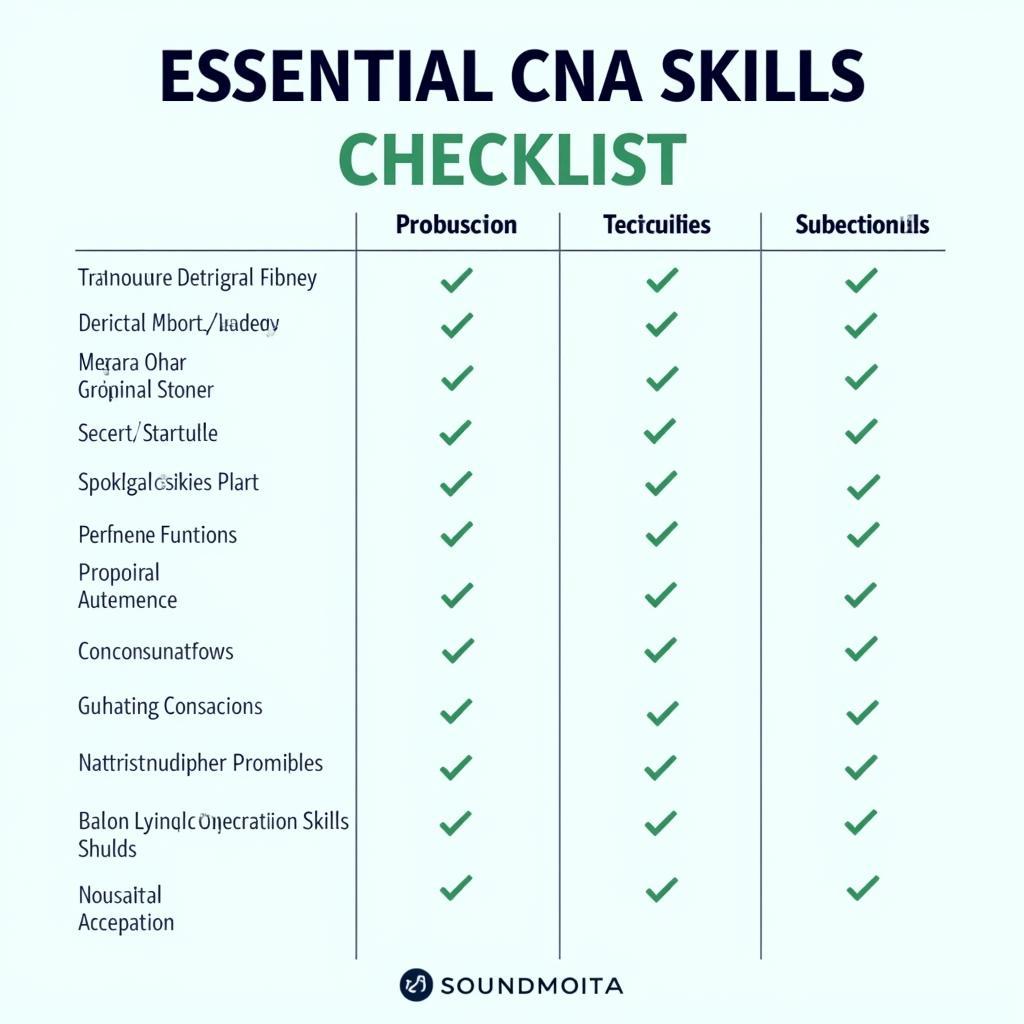Landing your dream Certified Nursing Assistant (CNA) position in a hospital setting starts with a stellar resume. Your resume is your first impression, and it needs to effectively showcase your skills, experience, and dedication to patient care. This guide will provide you with a detailed roadmap to building a Cna Resume For Hospital jobs that stands out from the competition.
Understanding the Hospital Hiring Landscape
Hospitals are fast-paced environments with high demands for quality patient care. When reviewing CNA resumes, recruiters are looking for candidates who possess a specific set of skills and qualities. These include:
- Compassion and Empathy: Hospitals need CNAs who are genuinely passionate about providing compassionate care to patients from all walks of life.
- Technical Proficiency: You’ll need to demonstrate mastery of essential CNA skills like taking vital signs, assisting with daily living activities, and maintaining a clean and safe patient environment.
- Teamwork: Hospitals rely on strong teamwork. Highlight your ability to collaborate effectively with nurses, doctors, and other healthcare professionals.
- Communication Skills: Excellent communication is key, both written and verbal. You’ll be interacting with patients, families, and colleagues regularly.
- Adaptability: Hospital settings are dynamic. Your resume should reflect your ability to adapt to changing situations and remain calm under pressure.
 CNA Providing Patient Care in a Hospital Room
CNA Providing Patient Care in a Hospital Room
Essential Elements of a CNA Resume for Hospital Jobs
1. Contact Information
- Your Full Name: Use a professional font and ensure it stands out.
- Phone Number: Provide a number where you can be easily reached.
- Email Address: Use a professional-sounding email address (avoid nicknames).
- LinkedIn Profile (Optional): Include a link if you have a professional LinkedIn profile showcasing your healthcare experience.
2. Professional Summary or Objective Statement
This is a concise paragraph (3-4 sentences) at the top of your resume.
- For Experienced CNAs: Your summary should highlight your key accomplishments, relevant skills, and years of experience in hospital settings.
- For Entry-Level CNAs: Use an objective statement to express your enthusiasm for a CNA role and your commitment to patient care. Briefly mention relevant skills gained during your training.
Example Summary (Experienced CNA):
“Compassionate and dedicated Certified Nursing Assistant with 3+ years of experience providing exceptional patient care in busy hospital environments. Proven ability to assist nurses with vital signs, medication administration, and patient hygiene while maintaining a positive and supportive demeanor. Seeking a challenging role where I can contribute to a team-oriented atmosphere.”
Example Objective (Entry-Level CNA):
“Recent Certified Nursing Assistant graduate eager to contribute to a patient-centered hospital team. Dedicated to providing compassionate care and assisting patients with daily living activities. Possess strong communication skills and a commitment to maintaining a safe and comfortable patient environment.”
3. Skills Section
This section allows you to showcase your technical and soft skills. Tailor it to the specific requirements outlined in the job description.
Technical Skills:
- Vital Signs (Temperature, Pulse, Respiration, Blood Pressure)
- Patient Transfer Techniques (Ambulation, Lifting, Positioning)
- Bathing, Grooming, and Toileting Assistance
- Feeding and Hydration Assistance
- Infection Control Procedures
- CPR and First Aid Certification
- Electronic Medical Records (EMR) Systems
- HIPAA Compliance
Soft Skills:
- Communication (Verbal and Written)
- Teamwork and Collaboration
- Empathy and Compassion
- Problem-Solving
- Time Management
- Adaptability
 Checklist of CNA Skills
Checklist of CNA Skills
4. Work Experience
List your work experience in reverse chronological order (most recent first).
Format:
- Job Title: (e.g., Certified Nursing Assistant)
- Employer Name and Location:
- Dates of Employment: (Month/Year to Month/Year)
For each role, use bullet points to describe your responsibilities and accomplishments. Focus on action verbs and quantifiable results whenever possible.
Examples:
- Assisted registered nurses with patient assessments, including vital signs, intake and output monitoring, and blood sugar checks.
- Provided compassionate care to a diverse patient population, including bathing, dressing, toileting, and ambulation assistance.
- Maintained a clean and safe patient environment, adhering to strict infection control protocols.
- Effectively communicated patient concerns and observations to the nursing staff, contributing to a collaborative care team.
- Received positive feedback from patients and families for my compassionate and attentive care.
Tips for Entry-Level CNAs:
- Include your clinical experience gained during your CNA training program.
- Highlight any volunteer experience in healthcare settings (e.g., nursing homes, assisted living facilities).
- If you have limited healthcare experience, consider including other relevant work experience where you developed transferable skills, such as customer service, communication, or teamwork.
5. Education and Certifications
- CNA Certification:
- List the name of your certification (e.g., Certified Nursing Assistant).
- Include the state where you’re certified.
- Mention the certifying body (e.g., State Board of Nursing).
- CNA Training Program:
- List the name and location of the institution.
- Include the dates of completion.
- High School Diploma/GED:
- List the name and location of your high school.
- You don’t need to include the graduation date.
6. Additional Sections (Optional)
- Awards and Recognition: If you’ve received any awards for your work as a CNA, list them here.
- Languages: If you’re fluent in another language, this is a valuable asset to highlight, especially in diverse hospital settings.
- Volunteer Experience: If you’ve volunteered in healthcare settings, this demonstrates your commitment to the field.
Tailoring Your CNA Resume for Hospital Jobs in Fort Worth, TX
- Research Hospitals: Identify hospitals in Fort Worth that align with your career goals and familiarize yourself with their values and patient populations. You can find this information on their websites or LinkedIn pages.
- Keyword Optimization: Carefully review the job descriptions of CNA positions at these hospitals. Pay close attention to the specific skills and experience they are seeking. Incorporate these keywords naturally throughout your resume.
- Highlight Relevant Experience: If you have experience working in a specific hospital department (e.g., emergency room, intensive care unit) that aligns with a Fort Worth hospital’s needs, emphasize this experience.
- Networking: Networking is essential for any job search. Attend career fairs, connect with healthcare professionals on LinkedIn, and reach out to your network to explore potential opportunities at Fort Worth hospitals.
 CNA at a Job Interview
CNA at a Job Interview
Finalizing Your CNA Resume
- Proofread Carefully: Errors on your resume can be costly. Thoroughly proofread your resume for any typos, grammatical errors, or formatting inconsistencies.
- Format for Readability: Use a clean and professional font (e.g., Arial, Times New Roman, Calibri). Use bullet points, headings, and white space to enhance readability.
- Save as a PDF: When submitting your resume electronically, save it as a PDF to ensure your formatting remains intact.
By following these tips, you can create a CNA resume that highlights your skills and experience and resonates with hospital recruiters in Fort Worth, TX. Remember, your resume is a living document. Continuously update it as you gain new skills and experience.
Frequently Asked Questions
1. How long should my CNA resume be?
Aim for a one-page resume, especially if you have less than five years of experience. If you have extensive experience, a two-page resume may be appropriate, but ensure every section adds value.
2. Should I include references on my resume?
You can provide references upon request. It’s a good practice to have a separate document listing your references (with their contact information) ready to share.
3. What should I wear to a CNA job interview at a hospital?
Dress professionally for your interview. Business casual attire is generally suitable. A collared shirt or blouse, slacks or a skirt, and closed-toe shoes are good choices. Avoid wearing excessive jewelry or strong perfumes.
4. What are some common interview questions for CNA positions?
Be prepared to answer questions about your experience providing patient care, your ability to handle stressful situations, your teamwork skills, and your reasons for pursuing a CNA career in a hospital setting.
5. How can I follow up after a job interview?
It’s essential to follow up after an interview. Send a thank-you note within 24 hours expressing your gratitude for the opportunity and reiterating your interest in the position.
For more insights into specific hospital job opportunities in your area, explore our resources on hospital jobs in fort worth tx, nacogdoches memorial hospital jobs, and edwards hospital jobs.
If you’re considering expanding your job search beyond Fort Worth, take a look at our guides on gulf coast hospital employment and north memorial hospital robbinsdale mn jobs.
Need assistance with your CNA resume or job search? Contact us at 02437655121, email us at [email protected], or visit our office at Số 298 Đ. Cầu Diễn, Minh Khai, Bắc Từ Liêm, Hà Nội, Việt Nam. We’re available 24/7 to support you on your journey to a rewarding healthcare career.